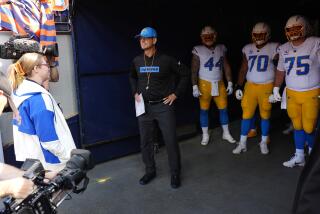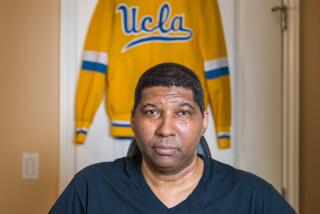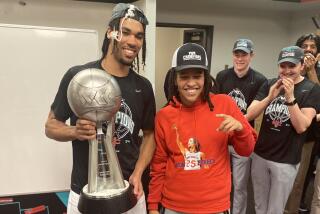Just What Doctor Ordered : Marcus Camby Is Impressive for No. 1 Massachusetts in Return, Giving School a Needed Lift After a Death and a Collapse
AMHERST, Mass. — A chilling wind howled through the campus of the University of Massachusetts before dawn, but by the time afternoon rolled around, few students or alumni in this picturesque Northeast community felt the cold.
Saturday afternoon inside Mullins Center, Marcus Camby, arguably the best college basketball player in the nation, warmed the hearts of a sellout crowd of 9,493 by returning to play for the first time since he mysteriously collapsed two weeks ago.
With a trademark dunk midway through the second half and an animated move afterward that he said came from Shawn Kemp, Camby thrilled the crowd and signaled his return in a 72-47 Massachusetts victory over St. Bonaventure. It was the No. 1-ranked Minutemen’s 18th consecutive victory. They remain the only undefeated team in the nation and are 6-0 in Atlantic 10 Conference games after dropping St. Bonaventure to 5-11 and 1-6.
And to think Camby was worried his return would mess up the team’s chemistry.
“I’m actually relieved, maybe after today you guys [the media] will leave me alone,” said Camby, not exactly joking. “It’s good to show the world there is truly nothing wrong with me.”
Camby, who missed four games, started at center and played 26 minutes. He led the team with 19 points, nine blocks--which tied a school record--and seven rebounds. But his game didn’t really come together until the second half, when he made three consecutive baskets and blocked four consecutive shots. A jumper from the corner gave Camby the 1,000th point of his three-year career.
“Once I hit that shot, I thought, ‘I’m back, I’m back,’ ” Camby said.
But even Camby had his doubts before the game began. He was concerned because after a week of tests at the UMass Medical Center doctors still don’t know what caused him to lose consciousness for 10 minutes before a game against St. Bonaventure in Olean, N.Y., on Jan. 14.
“I’m confident going back out on the court, but I still have my doubts . . . You never know if it will happen again,” Camby said.
He was concerned because his mother, Janice, who attended the game, has been concerned. “I’ve been a little on edge,” she said.
He knew that his collapse evoked chilling memories of former Loyola Marymount player Hank Gathers and, especially in this part of the country, former Boston Celtic Reggie Lewis, both of whom collapsed once while playing basketball, recovered, then collapsed again and died of heart disorders. Camby had thought about this more than once before doctors ruled out his heart.
Tyrone Weeks, Camby’s roommate, had also agonized about it.
“I knew Gathers, so it was the first thing that popped into my head,” said Weeks, who grew up around the corner from Gathers in the Raymond Rosen Projects in Philadelphia. “I never talked to Marcus about it, because I didn’t want to put anything in his head about Hank.”
But the relief felt Saturday from Camby’s successful return extended beyond his teammates and family to the UMass students and alumni. His triumph helped to ease the pain and nervousness that has plagued this campus for the past two weeks when it suffered not only the scare of Camby’s collapse, but the death of another popular athlete.
*
Four days before Camby lay unconscious, Greg Menton, a Massachusetts swimmer, collapsed in the arms of his coach after finishing the 100-yard freestyle event.
For Menton, 20, the first full scholarship aquatics athlete in Massachusetts history, there was no warning. He died an hour later of an unusual congenital heart problem, cardiac dysrhythmia, which doctors say involves a malformed artery. It is usually not diagnosed until after death.
“He was sitting next to me on the bench at the meet, and we were both watching the breaststroke and talking about how the event wasn’t going so well for us,” said his coach, Russ Yarworth. “Suddenly he says, ‘Oh my God, Russ,’ and slumped against me.”
When Yarworth called Menton’s parents to tell them their son had died, Menton’s mother was rushed to the hospital with chest pains. She was in intensive care for four days before being released for the funeral.
Doctors say that Menton’s arter ies were not able to supply his heart with enough blood during vigorous activities, including sports, but they consider it a medical mystery as to why it happened to him at the time it did. He had been active in sports all his life.
“These things are supposed to happen to people who are fat and smoke,” said Dave Glover, Massachusetts academic advisor. “They are not supposed to happen to healthy 20-year-olds.”
The basketball team was in Philadelphia for a game against St. Joseph’s when they heard the news about Menton. Massachusetts Coach John Calipari got the team together and said a prayer for Menton and his family, who live in Dundee, Ore.
“When I went down, people were thinking about what happened to the swimmer,” Camby said. “It’s been a crazy week for me as well as the fans at UMass.”
Later, it was the swim team that prayed for Camby. “If I had seen Marcus collapse, it would have blown my mind,” Yarworth said.
“For both of these things to happen in the same week, it wouldn’t happen once in a four-year career,” said Leigh Torbin, a Massachusetts sophomore. “It’s bizarre, especially for a student here.”
*
It is not often that someone passes out for as long as 10 minutes for no apparent reason, but doctors at UMass Medical Center say it does happen. The length of Camby’s unconsciousness is what caused doctors to take a harder look. It is also what required Camby to stay in the hospital for five days.
“Marcus’ first comment to me when I talked with him was, ‘You got to get me out of here,’ ” said Glover, the academic advisor.
Camby didn’t like the food. His bed was too short--he is 6 feet 11. And he didn’t like all the needles being stuck in him by doctors in white coats.
“He is an adolescent, but because he was so tall, I was treating him like a 40- or 50-year-old adult rather than a 21-year-old,” UMass cardiologist Joel Gore said. “Then I talked to my 19-year-old daughter about it, and she reminded me what it’s like to be a kid. So I brought him Cheetos and chocolate chip cookies and things got better after that.”
Camby appears to be anything but a prima donna, but it was his first time in a hospital and he was scared. Gore, however, was immediately encouraged by medical reports that Camby had a strong pulse--about 65-70 beats per minute--during the time he was unconscious. Camby also had amnesia from about 15 minutes before the event until he arrived at the hospital, which is not typical of someone with a cardiac condition.
“The fact that the pulse was strong meant he had a blood pressure,” Gore said. “Cardiac causes of passing out are typically not associated with a slow pulse or a strong pulse. When somebody is unconscious, such as with Hank Gathers or Reggie Lewis, their heart rhythm is very, very slow, in the 20s or 30s, or very, very fast 200-300-400, and you usually can’t feel the pulse because the blood pressure is so low.”
Gore, however, along with Dr. David Drachman, chairman of the neurology department at UMass Medical Center, went on to perform myriad tests. They checked for conditions that could have caused the lengthy blackout, which could include seizures, hypoglycemia and low blood pressure. They checked for tumors and head injuries and drugs.
“Marcus kept telling me that every time myself and Dr. Drachman walked into the room he would get a headache,” Gore said.
The results of the tests appeared to lean more toward a neurological cause, Gore said, so he did not continue with tests that might have put Camby at risk. But Drachman also came up with zeros.
“One thing that might have happened that we will never know--and this is purely speculative--is that he might have walked on to the bus, bumped his head, but he would not remember,” Drachman said. “Then he would have a blank time for the interval to the time he blacks out. This is well known in a number of other fields, like boxing and football. It’s a head injury.”
Both Gore and Drachman cleared Camby to play with no restrictions or medical supervision, but Drachman did provide Camby with a list of what he can’t do off the court.
No tight-rope walking, no climbing ladders and no scuba diving for the next six months. No kidding.
“Were he to develop another spell doing these things, it could be very dangerous,” Drachman said. “Whereas playing ball--other than the notion that ‘Gee, they didn’t fix it the first time’--if he fell down, so be it. A lot of players fall down. And maybe that incident would be more revealing.
“Did your car ever stall on the freeway? Did they ever figure out what it was?”
*
Camby has been in the college basketball spotlight since his team’s first game of the season against Kentucky, when he had 32 points, nine rebounds and five blocks to help beat the then-No. 1 team. The fainting incident brought him fan mail numbering in the high hundreds, he says, including 40 pages on the Internet. Even Massachusetts Sen. Edward Kennedy called him at the hospital.
“Marcus was at my house after he was released from the hospital and we were flipping through the television channels and at one time, every channel had a story on about him,” Glover said.
“Marcus said to me, ‘You would think they would get tired of me.’ ”
Judging from the outpouring of respect from fans during Saturday’s game, that probably is not going to happen any time soon. Instead, this campus can rest for a night. And so can Camby’s mother.
“I’m all right now,” she said, holding the basketball that put her son over 1,000 points. “The game is over.”
More to Read
Go beyond the scoreboard
Get the latest on L.A.'s teams in the daily Sports Report newsletter.
You may occasionally receive promotional content from the Los Angeles Times.










